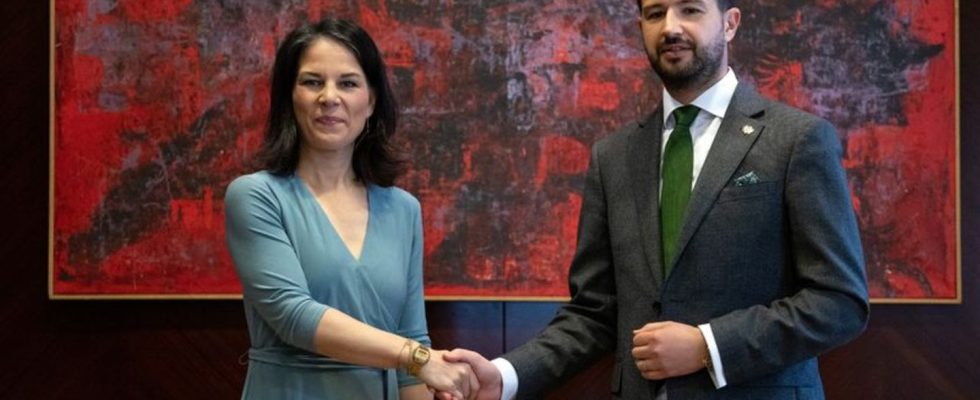Federal Government
Baerbock: Support Western Balkan states on their way to the EU
Foreign Minister Annalena Baerbock will be received for talks by Jakov Milatovic, President of Montenegro, during her visit to Montenegro. photo
© Soeren Stache/dpa
Moscow is trying to strengthen its influence in the Western Balkans in parallel with the war of aggression in Ukraine. The Foreign Minister wants to send a European signal in Podgorica and Sarajevo.
Foreign Minister Annalena Baerbock is accelerating the EU expansion to include Western Balkan countries such as Montenegro and Bosnia-Herzegovina, also in view of Russian and Chinese attempts to influence the region. “The faster we than “The European Union becomes stronger in these geopolitical times, all the better,” said the Green politician at a meeting with her Montenegrin colleague Filip Ivanovic in the capital Podgorica. At the same time, she emphasized: “Enlargement is not an end in itself, but rather it serves to strengthen our common ground Europe.”
“EU expansion to the Western Balkans is a geopolitical necessity”
Baerbock emphasized that the Russian war of aggression against Ukraine made EU expansion in the Western Balkans a “geopolitical necessity.” As in Ukraine, “here in the Western Balkans, the European project is a guarantee of freedom, democracy, the rule of law and prosperity.” Ivanovic called Baerbock’s visit at a time of major reforms in his country a confirmation that the European Union was interested in the Western Balkans. “There is no alternative to integration if we want a stable region. It is the path to stability and easier dispute resolution,” he added.
Russian and Serbian influence on Montenegro
Since October 2023, there has been a new government in Montenegro led by Prime Minister Milojko Spajic, which is committed to reforms. However, Spajic also governs with the support of pro-Serb and pro-Russian parties. Ivanovic acknowledged that there were concerns about negative influence from Russia. But he also emphasized: “In Montenegro, 80 percent of citizens are European-oriented, which says enough about how and in what way Montenegro is oriented.” In addition to Spajic and Invanovic, Baerbock also met Montenegrin President Jakov Milatovic.
Huge debt to Beijing
Montenegro has become enormously indebted to China. The background is the construction of a highway that the Chinese want to build from the Adriatic to the Serbian border by 2030. Since construction began in 2009, only around 40 of the approximately 167 planned kilometers have been completed. Most recently there was talk of a total cost of 2.7 billion euros – corruption may also have been involved.
Against this background, Baerbock admitted that it was a mistake “that Europe was not there when it needed important infrastructure investments” in Montenegro. The fact that the country is now tackling its major infrastructure projects, for example in the railway or automotive sectors, with European support is “not just a strengthening of your own infrastructure, but a strengthening of European sovereignty”.
EU enlargement is also a central issue in Bosnia-Herzegovina
Montenegro and Bosnia-Herzegovina are among the so-called Western Balkan countries, which also include Albania, Serbia, North Macedonia and Kosovo. In Brussels, Montenegro is seen as furthest along in the accession process. EU enlargement is not expected until the end of the decade at the earliest. The EU has been conducting accession negotiations with Montenegro since 2012. Bosnia-Herzegovina has candidate status but is not yet in negotiations.
In Sarajevo, the capital of Bosnia-Herzegovina, Baerbock met members of the country’s state presidency in the evening. It consists of one representative each of the Bosniak, Serbian and Croatian ethnic groups: Denis Becirovic (Bosniak), Zeljka Cvijanovic (Serbian) and Zeljko Komsic (Croatian). The chairmanship rotates every eight months. During a conversation with the High Representative of the international community in Bosnia-Herzegovina, the German Christian Schmidt, the Federal Foreign Minister found out about the situation in the country.
Divided Bosnia-Herzegovina
Bosnia-Herzegovina is divided into the entities called the Federation of Bosnia-Herzegovina (abbreviated FBiH) and the ethnic-Serbian part Republika Srpska (RS). The president of the RS is the Serbian nationalist Milorad Dodik, who is seeking secession. Dodik is on trial in Sarajevo for arranging for Schmidt’s decisions to no longer be published in the RS’s official gazette. Recently, Dodik visited long-term Belarusian ruler Alexander Lukashenko and Russian President Vladimir Putin. Putin awarded him the prestigious Russian Order of Nevsky.

